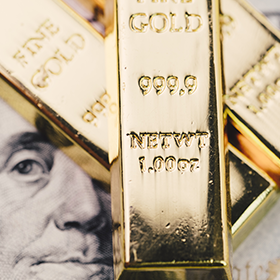3 Reasons Why Gold Doesn't Collapse Like the Stock Market
 Estimated reading time: 2 minutes
Estimated reading time: 2 minutes
There are probably as many investment theories as there are investors. Apart from the obvious — buy low, sell high — these theories, or strategies, may be driven by data, by advice received from advisors, by personal experience, or even by superstition.
Investing in precious metals has its own set of maxims. This article looks at three of them.
1. The gold price generally works in opposition to the equity markets
In other words, when the stock market crashes, gold prices rise. Historically, the data support this idea. Jeff Clark, a senior analyst for GoldSilver, draws on years of data to show that, “on average, when the stock market crashes, gold has historically risen more than declined. Gold has also historically outperformed the cash sitting in your bank account or money market fund.”
The logic is this: The stock market rewards growth. Gold benefits from distress. When people seek a safe haven from volatile stock markets, gold is a favored recourse.
It’s true that gold did not fare well in the months immediately after the financial crisis of 2008. However, gold bounced back and ended the year up 5.5%, and over the course of the 18-month stock sell-off in 2008/09, gold actually rose more than 25%.
It also pays to remember that gold’s longest bull market in the 1970's happened when the equities markets were basically flat. The S&P returned a mere 14.3%. Gold, on the other hand, rose from $35 per ounce to $850 in January 1980, an amazing increase of 2,328%.
2. Inflation rates predict the gold price
Nothing predicts the gold price, but inflation does play a role. And while gold has historically been a reliable hedge against inflation, Will Rhind, CEO of GraniteShares, has been quoted as saying that, today, interest in gold is driven by: "the weaker U.S. dollar, and more volatility and increasing fears of inflation in the market."
He added that “investors should focus less on monetary policy when assessing gold's future and more on the dollar and equity market volatility.”
3. Gold will never lose its value as currency
Gold derives part of its value from the fact that it can be traded across borders, as it has been for centuries. But try walking into a shop today and handing over a gold coin to pay for your groceries. As a recent article in The Atlantic notes, if the U.S. economy does collapse, trading your U.S. dollars for euros or yuan might be an easier approach.
No matter how much the price of gold fluctuates, however, it retains its intrinsic value. It also functions as a way to diversify your investment portfolio. And, diversification is an investment strategy that has stood the test of time.
Self-Direction as a Way to Invest in Gold for your Retirement
Self-Directed IRAs give you the opportunity to explore the potential of adding gold to your retirement savings investment strategy. There are specific requirements for the Gold to be available for investing under an IRA. That is why they need help through our precious metals center.
Visit our Precious Metals Center to learn more about how you can invest in gold and other precious metals using a Self-Directed account with The Entrust Group.




























0 Comment